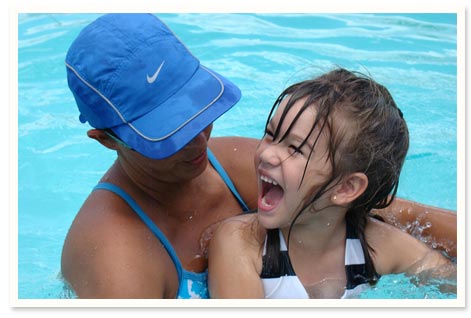Autism and Swimming: Children with Autism Can Benefit From Physical Activity
 The Children with autism are certainly not incapable of participating in athletics. Just ask sixteen-year-old Nathan of central Indiana if he lets autism slow him down. He actively participates as a member of his High School swim team. Children with autism experience a great deal of benefit from physical activity, which can include: The Children with autism are certainly not incapable of participating in athletics. Just ask sixteen-year-old Nathan of central Indiana if he lets autism slow him down. He actively participates as a member of his High School swim team. Children with autism experience a great deal of benefit from physical activity, which can include:
-
Ease repetitive behaviors
-
Act as a positive social outlet
-
Increase attention span
-
Reduce risk of later adult health conditions of obesity and heart disease
How Does Exercise Help
“People with autism experience levels of sensory perception that most of us wouldn’t know or understand,” Dr. O’Connor said. “It overloads them, so they engage in behaviors that distract them. Exercise gives them the same benefits but it doesn’t have the negative social connotations.”
John O’Connor, an associate professor of adapted physical education at Montana State University-Northern, explained why. Running and swimming involve rhythmic movements that are similar to stereotypical behaviors, and may distract people with autism the same way flapping their hands or walking on their toes does. Researchers have been aware of how exercise can reduce repetitive behaviors but this knowledge is often left by the wayside.
The Challenges of Autism and Sports
Each child has his or her unique challenges that a fitness instructor must adapt to. The challenges vary as the severity of the condition varies. Some children are withdrawn, while others engage. Some children speak fluently while other do not speak at all. It is through patience and communication with parents that physical activity instructors (coaches, swim instructors, etc.) can best understand how to teach the child how to swim, surf or participate in running or martial arts.
Swim instructor Julie Gross of the Super Swimmers Foundation sees the benefits of swimming each day as she and her fellow instructors provide swim instruction for children with autism and other special needs. She has witnessed how swimming can help a child to improve their speech, coordination and physical fitness with an activity as simple and enjoyable as swimming.
Parents should encourage their children to participate in physical activity through support and guidance. Sometimes it can take time breaking down each step of the activity in order to introduce even toes in the water, but over time the child will begin to enjoy not only the health benefits of the activity, but the sheer fun of it.
For more information about autism and swimming, view our additional articles.
|